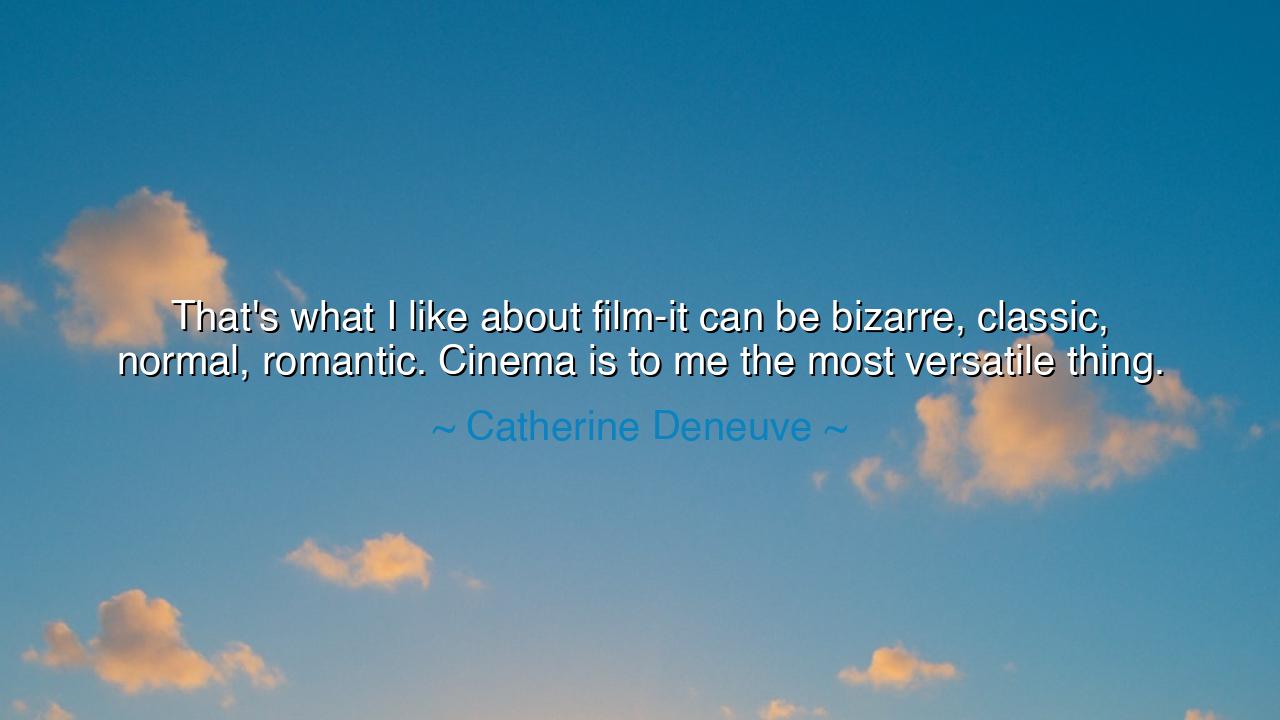
That's what I like about film-it can be bizarre, classic, normal
That's what I like about film-it can be bizarre, classic, normal, romantic. Cinema is to me the most versatile thing.






"That's what I like about film—it can be bizarre, classic, normal, romantic. Cinema is to me the most versatile thing." These words from Catherine Deneuve speak to the power and boundlessness of cinema—a medium that, much like life itself, defies the limitations of form and structure. In her statement, Deneuve highlights the transformative nature of film, its ability to move between worlds, to evoke the profound and the mundane, the beautiful and the strange. Film, she suggests, is a vessel capable of carrying the full spectrum of human experience and emotion, from the most bizarre of visions to the most timeless of tales, each finding its place within the expansive realm of storytelling.
In the ancient world, storytellers like Homer used the medium of oral tradition to craft narratives that were similarly versatile—capable of evoking the deepest emotions and greatest adventures, and at the same time, offering insight into the human condition. The Iliad and the Odyssey, epic tales of war, love, and heroism, were not just stories of gods and warriors, but allegories for the struggles and triumphs of ordinary people. Cinema, like these ancient epics, serves as a mirror to the vastness of human existence, reflecting our joys, fears, and dreams. What film offers today is the same multi-layered narrative that the ancients explored, but with the added power of visual expression, elevating the storytelling to new heights.
Take, for example, the timeless tale of Romeo and Juliet. While the story itself is a classical, romantic tragedy, it has been adapted into countless forms—from the Elizabethan stage to the modern streets of West Side Story—and yet its core message remains unchanged. Film, in its versatility, can capture this eternal romance, placing it in diverse settings, even reimagining it in ways that reflect our own changing times. In this sense, film is a living art, capable of both preserving tradition and innovating to create new interpretations that speak to the ever-evolving human spirit.
The bizarre nature of cinema, as Deneuve notes, also reveals a unique power of the medium. Consider the surreal works of Luis Buñuel or the fantastical landscapes of Federico Fellini. These films did not merely seek to reflect the world as it was, but instead opened up new realities—worlds that were warped, unsettling, and dreamlike. Buñuel’s Un Chien Andalou, for instance, defies all logic and structure, presenting a disjointed series of images that challenge the viewer’s perceptions of reality. This is the versatility of cinema: it does not merely reproduce life, but allows us to step into the most strange and imaginative versions of existence, offering us an experience that stretches the limits of our perception.
Deneuve’s view also aligns with the notion that art, in its highest form, is not restricted by convention. Plato, in his Republic, argued that art should mimic the ideal and elevate the soul, while Aristotle believed that storytelling, whether tragic or comedic, should reflect the full range of human emotions. Both understood that true art must capture the totality of experience. Film has inherited this mantle, capable of weaving together light and shadow, joy and sorrow, order and chaos, all within the same frame. It gives us the freedom to imagine the impossible, to live in the bizarre and romantic realms that reflect the contradictions within our own hearts.
In cinema, we find not just entertainment but a form of expression that reflects the world in all its complexity. The romantic films that touch the heart, like Casablanca or The Notebook, remind us of the power of love, while the bizarre and avant-garde films push us to question the boundaries of reality and perception. Much like theatre in ancient times, cinema can transform the ordinary into the extraordinary, creating a shared experience that connects viewers across space and time. It invites us to explore both the most classical ideals of love and heroism and the darker, more peculiar aspects of the human psyche.
The lesson that Deneuve imparts through her admiration for the versatility of film is one of embracing change, of recognizing that true creativity is not confined to one narrow form but is an exploration of the limitless possibilities that art can offer. Just as the ancients understood that storytelling could inspire both nobility and reflection, cinema today carries that same torch—sometimes light, sometimes dark, but always a reflection of the human experience. Let us then embrace this versatility in our own lives, allowing ourselves to explore the many facets of who we are, to challenge norms, and to create our own stories. In this, we find the full potential of art, whether on the screen or in our own hearts.






AAdministratorAdministrator
Welcome, honored guests. Please leave a comment, we will respond soon